Imran Khan’s demise has been swift and brutal – but it would be a mistake to write him off
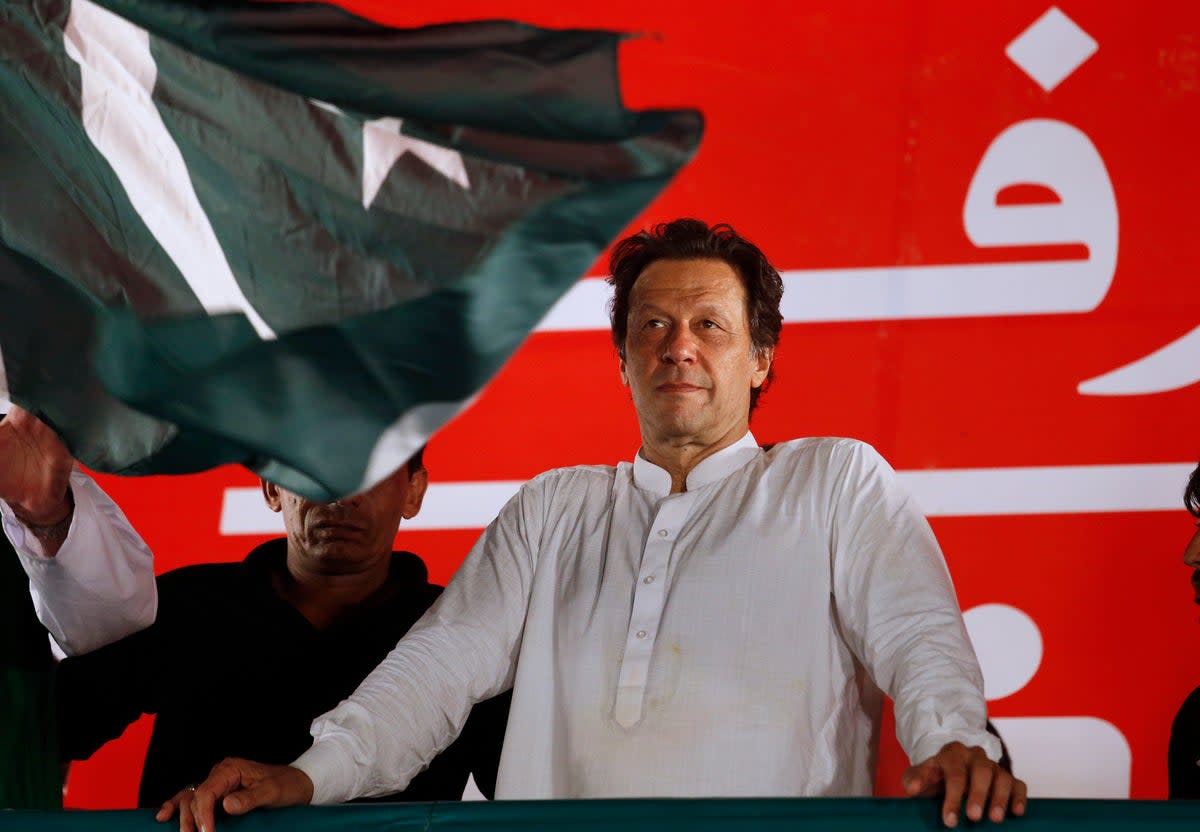
Few falls from power have been so swift and brutal. Just two years ago, cricket legend-turned-politician Imran Khan was comfortably ensconced in the prime minister’s house in Islamabad.
Many of his political enemies either languished in prison or had been dispatched into exile. The once raucous media had been successfully tamed. The powerful military, which had smoothed his ascent to power in 2018, sturdily propped up his government.
The pandemic had passed, with relatively little damage. Despite delivering on few of his lofty promises, he was convinced he was cruising to re-election while his ministers blithely boasted they would rule for a decade to come.
Now, Khan may spend that time behind narrowly spaced bars. On the eve of Pakistan’s elections (Thursday 8 February), he was first sentenced to 10 years for “leaking state secrets” and then 14 years for “selling state gifts”. On 30 January, he and wife Bushra Bibi were also sentenced to seven years in jail for an “illegal” marriage; they were charged with marrying before her “Nikkah” period after her divorce had expired. And these are just three of the nearly 200 cases he faces. More punishment will follow.
He has also been disqualified from standing for office for 10 years. Senior members of his party have been arrested, tortured, humiliated, dragged back and forth between prisons and courts. Some were allowed to leave politics after making scripted “confessions” in hostage-style videos. Others were peeled away, disqualified from standing as candidates, or remain targets of reprisals.
“There is one law for Imran Khan,” says Zulfi Bukhari, Khan’s closest aide, “and another law for everyone else. No matter what the outcome, it’s not going to be a fair election.”
When Pakistani voters shamble into polling booths next week, they won’t even find his party on the ballot papers. Khan’s party has been stripped of the cricket bat election symbol for which he is so well known – and the recognition of which so many illiterate voters rely on to be able to stamp their support.
No Pakistani election is without what euphemists call “irregularities”: candidates intimidated, defections engineered, the electoral playing field tilted in one side’s favour, and more than a few ballot boxes stuffed.
But this will be the most pre-determined election in living memory. What used to be months of lively, colourful rallies with thundering speeches, blaring music and dancing crowds have been reduced to a sombre vigil for what’s left of Pakistan’s democracy.
For nearly half of its history, Pakistan’s military directly ruled the country. For the rest, it exercised its sway backstage, keeping a granitic grip on the levers of power that matter most – the economy, foreign policy, national security – and discreetly manipulating events to its satisfaction.
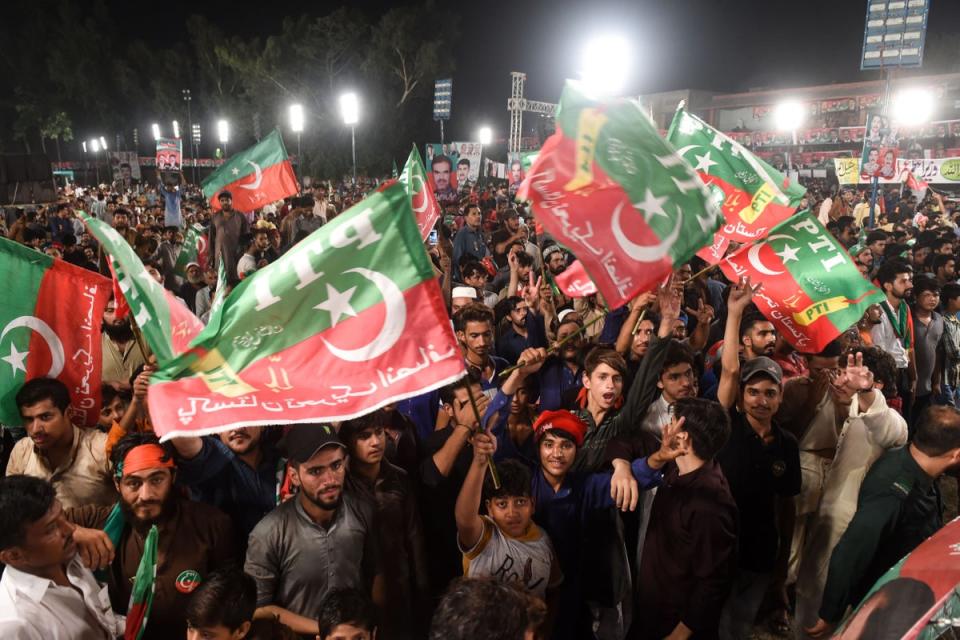
The only civilian prime minister to complete a full term was toppled in a coup and executed a couple of years later. Others were ousted unceremoniously, put on trial for corruption, and then banished.
When former prime minister Benazir Bhutto returned to Pakistan from exile in 2007, she was assassinated by militants two months later. The best political leaders have to hope for is a few years in government between spells of prison in Rawalpindi and exile in Kensington, Mayfair or Dubai.
Khan hoped to break with that history. After two decades in the political wilderness as a one-man show, the former cricket captain rediscovered cheering crowds.
In a country where two-thirds of the population is under 30, a new generation of voters came of age. They had grown up with a sense of Pakistan being a thwarted nation: mired in economic difficulty, scarred by years of terrorism, humiliated by how their country was perceived in the outside world, and ruled by callous elites who had plunged them to this ruin.
Pakistan has the world’s fifth-largest population, sixth-largest army, but only the 46th-largest economy – wedged between Chile and the Czech Republic.
Khan also found fresh support from the army. Once a fierce critic of former military ruler General Pervez Musharraf’s dictatorship (1999-2008), he slowly realised the only reliable route to power in Pakistan was aboard a tank.
What Khan lacked in votes, the military was happy to make up for with intimidation, censorship, defections and a burst of late-night numerical tinkering
By this time, the generals had also grown weary of the two political dynasties that alternated civilian power in Pakistan: the centre-right Sharifs of the Muslim League and the centre-left People’s Party of the Bhutto-Zardaris. Reflecting views of their own middle-class backgrounds, they saw the Sharifs and the Bhutto-Zardaris as irredeemably corrupt – and too willing to surrender national pride for the sake of marginally better relations with the West and India.
Between a new, thrusting generation and the old, crusty generals, Khan acquired a power base. Both constituencies liked his nationalism, his religious fervour, his charisma. They were impressed by his looks, his confident English, his Oxford education, his charity work and his celebrity.
No other Pakistani could count Liz Hurley, King Charles and Mick Jagger as friends. In an age of populism, the superficial mattered more than the substance.
Few of his supporters cared to reckon with the reality of Pakistan’s many deep problems, which require decades of agonising reform to address, but saw in Khan a “man of destiny” who would suddenly lift the country to the glory they felt it deserved. If he can win the World Cup and build a cancer hospital that treats the poor for free, why can’t he save Pakistan?
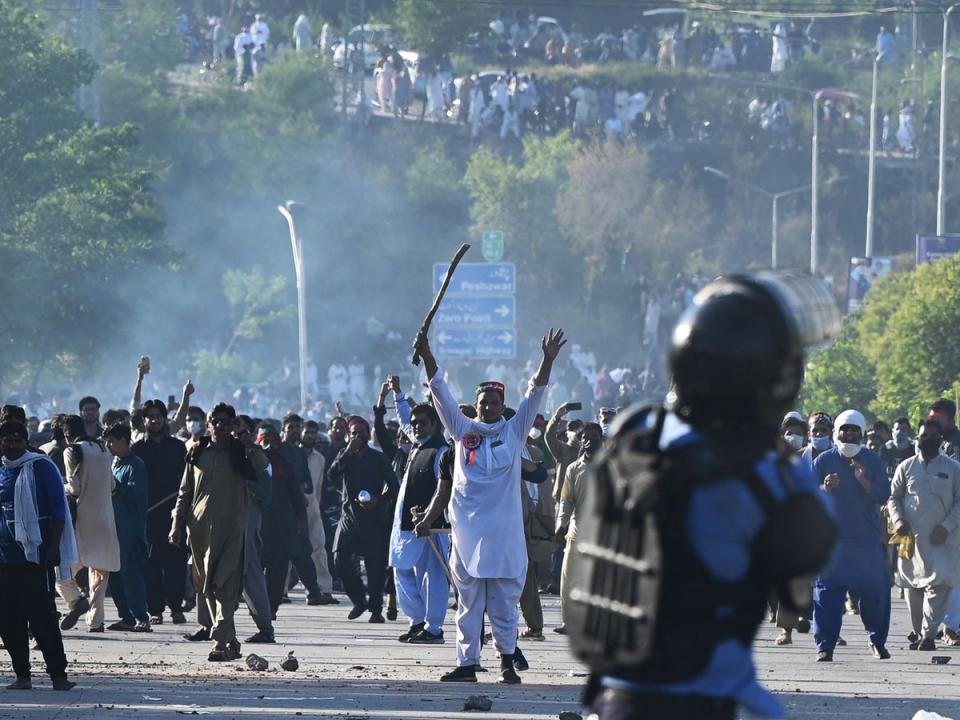
Khan didn’t discourage these hopes. In the lead-up to the 2018 elections, standing in a white shalwar kurta at the national monument in Lahore, he roused them with promises of a “new Pakistan”. “We are at a crossroads,” he boomed from the podium, slicing his hand through the air. “One way lies humiliation, and the other way lies the promise of [a] Pakistan that hundreds of thousands sacrificed their lives to create.”
At times he modelled this future on the Prophet Muhammad’s seventh-century city state in Madinah. At other times, he evoked Singapore and Sweden. He said he admired Westminster democracy, then threatened his rivals with prison without trial. He pledged to build a welfare state for the poor while surrounding himself with some of the country’s most recognisable capitalists and feudal landowners. He vowed to secure equal rights for minorities while supporting the very blasphemy laws that persecute them.
In these apparent contradictions, Khan embodied Pakistan’s own. He appealed to sections of liberals and conservatives. His fan base included singers and preachers. The crowds at his rallies were drawn from the wealthiest of Lahore and the poorest of Peshawar.
Some of his leading candidates were veterans of military regimes; others had served in democratic governments. Khan was the blank slate on which many disillusioned Pakistanis inscribed their ambitions.
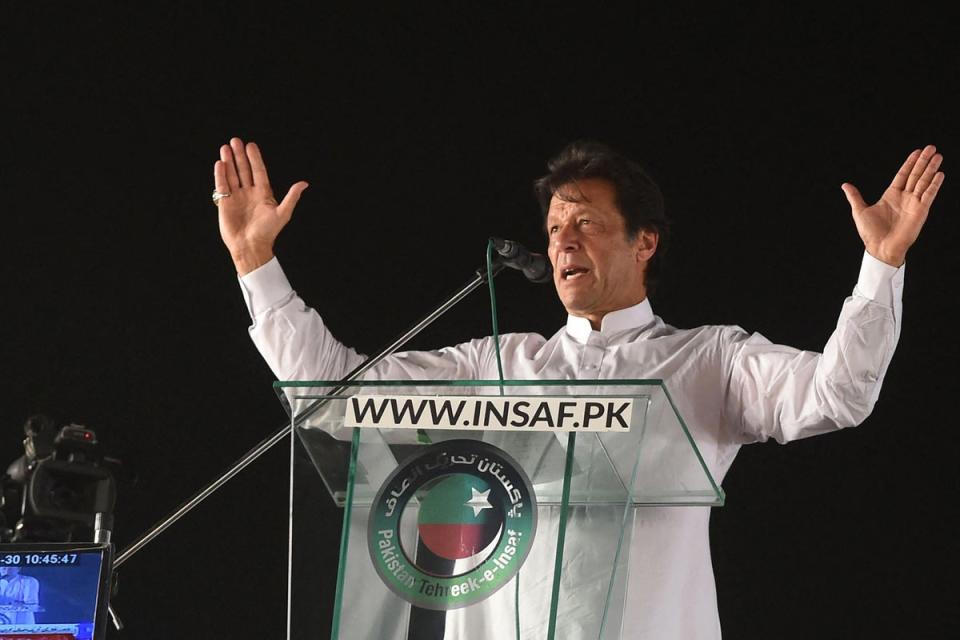
And what he lacked in votes, the military was happy to make up for with intimidation, censorship, defections and a burst of late-night numerical tinkering. Just enough to stitch together a ruling coalition.
In August 2018, Khan finally became Pakistan’s prime minister. But it was the generals who were in power. In parliament, Bilawal Bhutto Zardari, Benazir’s son and heir, mocked the fact when he offered congratulations to “the prime minister-select”.
Decisions were made at the military’s headquarters and dutifully signed off in the prime minister’s office. Khan was more often seen in the company of the army chief, General Qamar Javed Bajwa, and his intelligence chief, Lieutenant General Faiz Hameed, than with his own ministers.
The dreams of a new country gave way to memories of an older one. Repression returned to levels not seen since the grim years of Zia-ul-Haq’s dictatorship in the 1980s.
Opposition politicians were tossed in jail without charge or trial. Journalists were swept off television screens and newspaper columns vanished. Critics of the government were picked up from their homes, and ethnic-based protest movements were crushed with impunity. Khan also spoke like a tyrant, notoriously blaming victims of rape for “wearing very few clothes”.
Globally, Khan found himself increasingly isolated. On Valentine’s Day in 2019, a militant group attacked an Indian convoy in the disputed territory of Kashmir. In retaliation, the Indian forces struck deep inside Pakistani territory.
What used to be months of lively, colourful rallies with thundering speeches, blaring music and dancing crowds have been reduced to a sombre vigil for what’s left of Pakistan’s democracy
A startling dogfight ensued in the air, with an Indian jet shot down. The two nuclear powers managed to pull back from escalation. Pakistan’s other large neighbour and key ally, China, grew frustrated with the limited progress the Khan government made with its flagship Belt and Road Initiative infrastructure project. The Saudis and Emiratis, Pakistan’s bankrollers of last resort, felt Khan didn’t pay them the respect and importance they deserved – striking up relationships with Turkey, Malaysia and Iran instead.
One person Khan did get on with well was Donald Trump. In a warm dialogue of the demagogues, Trump introduced Khan to the press in the Oval Office as “the great athlete, one of the greatest”. Trump wanted to pull troops from Afghanistan, and he wanted his new friend Khan to help him.
The relationship appeared to be going well until Joe Biden was elected. For the first time in the country’s history, the new US president refused to place a call to Islamabad. The frostiness hardened into hostility when Khan appeared to cheer the Taliban’s sweep to power in August 2021, saying the militants had broken “the shackles of slavery”.
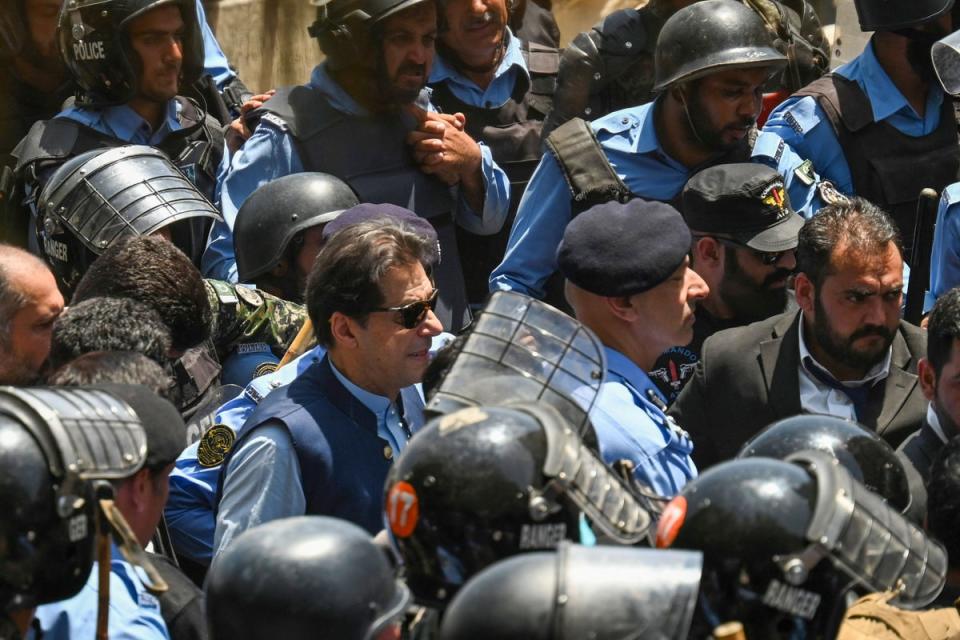
In late 2021, Khan began to lose more powerful friends. He defied General Bajwa, the army chief, by refusing to replace the head of Pakistan’s feared Inter-Services Intelligence agency, General Hameed. Khan and Hameed had grown close, sparking fears that the two were conspiring to entrench each other in power.
For Pakistan’s military, there’s no greater crime than meddling with its chain of command. “Imran Khan started to warn us,” recalls Bukhari, Khan’s friend and aide. “He knew that Bajwa was coming for him.”
In April 2022, Khan was bowled out by a parliamentary vote of no confidence with Bajwa’s blessing. It was a fatal miscalculation. As Khan had warned in a television address, he became “even more dangerous on the streets”.
Enraged by the manner of his exit and the fact he had been replaced by a coalition of the two dynasties, hundreds of thousands poured out in major cities in protests, some of which turned violent. The scenes were compared to the early days of the Iranian revolution. Rattled, Bajwa ordered the fiercest crackdown Pakistan has ever seen.
“At the height of the crackdown,” says Bukhari, “13,000 of our party members were in jail.” Women were dragged from their homes in the middle of the night and sexually assaulted. Ministers were arrested, bailed, and then immediately rearrested.
A well-known journalist who supported Khan disappeared from an airport. Others left the country in fear of the same fate. Khan’s own name could not be mentioned on television and photos blurred out his face.
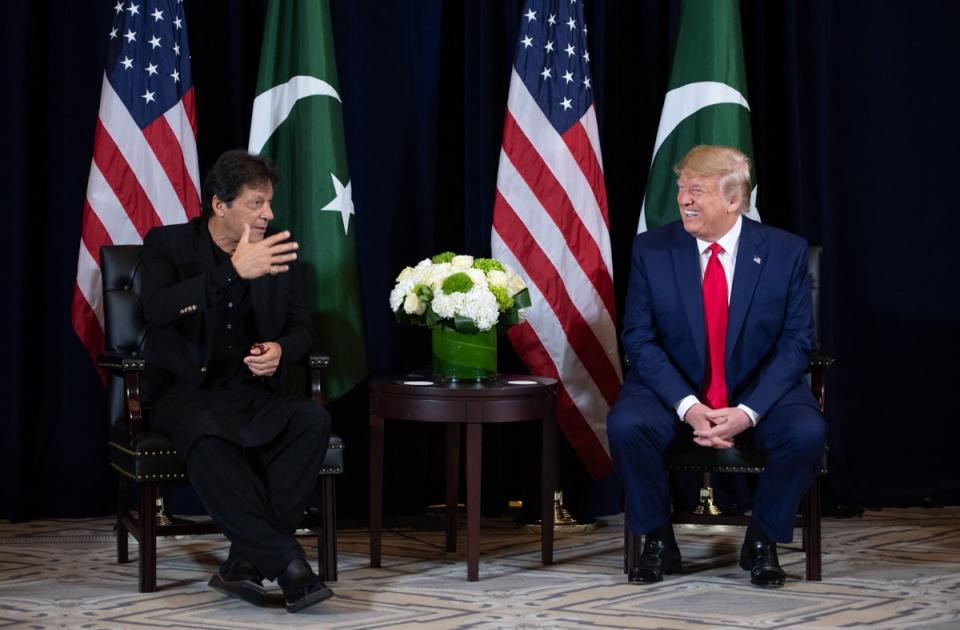
Khan blamed Bajwa and Joe Biden for his fate. Two months before the vote of no confidence, on the day of the invasion of Ukraine, Khan appeared in Moscow at Vladimir Putin’s side. The trip had been scheduled months in advance, but even as a war looked imminent, he refused to alter his plans.
Later at a rally, Khan flourished a piece of paper, saying it was a letter from America ordering his ousting. And the army chief, he added, cravenly capitulated to the pressure. Khan’s aide, Bukhari, is more cautious. “I’m not saying they actively took part in it,” he says of allegations of US involvement, “but they didn’t stop it.”
The more likely explanation is that Khan made his worst enemies at home. The current army chief, Asim Munir, was earlier sacked as intelligence chief by Khan. And the current chief justice, Qazi Faez Isa, was subject to a humiliating investigation by Khan’s government.
Khan once depended on the military and the judiciary for support. Now, two of the country’s most powerful institutions are headed by men who would be happy to see him destroyed.
But it would be a mistake to write Khan off. “I always fight till the last ball,” he once told me in an interview for this newspaper. Recent polls show that he’s still the most popular politician in the country.
Nawaz Sharif is likely to win a record fourth term as prime minister next week, but Khan’s friends and supporters hope that this term will be just as brief as his other stints in office. “I think you’ll see Imran Khan back as prime minister in a couple of years,” says Bukhari.

 Yahoo News
Yahoo News 
